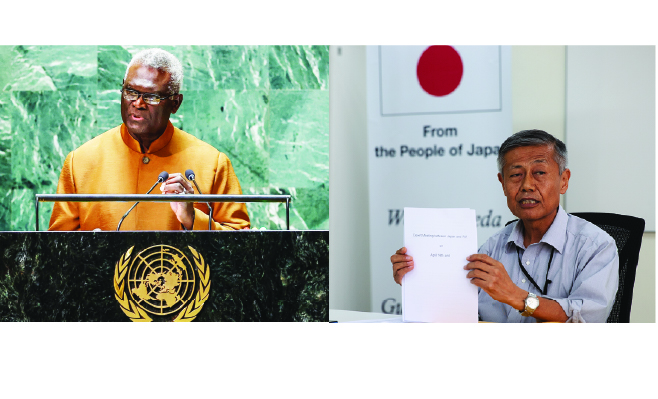
By Georgina Makaa |@MakaaGina
Japan’s Ambassador to the Solomon Islands, Miwa Yoshiaki, has expressed disappointment regarding Prime Minister Manasseh Sogavare’s recent statement at the United Nations General Assembly.
Sogavare had urged Japan to explore alternative solutions for its treated nuclear wastewater and to immediately cease its discharge into the Pacific Ocean.
Mr. Sogavare told the UN, “Solomon Islands stands with like-minded Pacific Islanders and is appalled by Japan’s decision to discharge over a million tonnes of nuclear-treated water into the ocean.”
But Mr. Yoshiaki emphasized that the Japanese government has never allowed and will never allow the discharge of water that would endanger human health and the marine environment.
He also highlighted that discussions on such important issues should ideally take place bilaterally before being brought to the international arena.
Yoshiaki stated that Japan is ready to discuss the matter at any time and referred to a review by the International Atomic Energy Agency (IAEA) released in July.
“The review confirmed that Japan’s plans to release treated water into the sea at Fukushima align with international safety standards,” he told local media.
However, Sogavare argued that “The IAEA Assessment report is inconclusive, and its scientific data shared is inadequate, incomplete, and biased.”
Sogavare emphasized the significance of the ocean to the Solomon Islands and expressed concerns about the potential risks posed by the discharge of treated nuclear water over a prolonged period, particularly in light of the already increased warming and acidification of the ocean.
Yoshiaki clarified that Japan has never discharged “nuclear waste water” that exceeds regulatory standards into the sea and assured that Japan has been strictly adhering to relevant international law and will continue to do so while considering international practice.
Earlier, Solomon Islands National University Chancellor Dr. Transform Aqorau described the issue as a “Betrayal to the Pacific trust.”
“These waters aren’t just geographical entities; they are the lifeblood of the Pacific Islands, underpinning cultures, livelihoods, and ecosystems. The mere whisper of nuclear contamination could irrevocably damage the integrity and security of the Pacific Islands’ tuna fishery, a cornerstone of the regional economy.”
On August 24, 2023, Japan began releasing nuclear-treated water into the Pacific Ocean.
